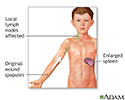Cat-scratch disease
CSD; Cat-scratch fever; Bartonellosis
Cat-scratch disease is an infection with bartonella bacteria. It is transmitted by cat scratches, cat bites, or flea bites.
Causes
Cat-scratch disease is caused by the bacteria Bartonella henselae. The disease is spread through contact with an infected cat (a bite or scratch) or exposure to cat fleas. It also can be spread through contact with cat saliva on broken skin or mucosal surfaces like those in the nose, mouth, and eyes.
Symptoms
A person who has had contact with an infected cat may show symptoms, including:
- Bump (papule) or blister (pustule) at site of injury (usually the first sign)
- Fatigue
- Fever (in some people)
- Headache
- Lymph node swelling (lymphadenopathy) near the site of the scratch or bite
- Overall discomfort (malaise)
Less common symptoms may include:
- Loss of appetite
- Sore throat
- Weight loss
Exams and Tests
If you have swollen lymph nodes and a scratch or bite from a cat, your health care provider may suspect cat-scratch disease.
A physical exam may also reveal an enlarged spleen.
Sometimes, an infected lymph node may form a tunnel (fistula) through the skin and drain (leak fluid).
This disease is hard to diagnose, in part because it is rare. The Bartonella henselae immunofluorescence assay (IFA) blood test can detect the infection caused by these bacteria. The results of this test will be considered along with other information from your medical history, lab tests, or biopsy.
A lymph node biopsy may also be done to look for other causes of swollen glands.
Treatment
Most often, cat-scratch disease is not serious. Medical treatment may not be needed. In some cases, treatment with antibiotics such as azithromycin can be helpful. Other antibiotics may be used, including:
- Clarithromycin
- Rifampin
- Trimethoprim-sulfamethoxazole
- Ciprofloxacin
In people with HIV/AIDS and others, who have a weak immune system, cat-scratch disease can be more serious. Treatment with antibiotics may be needed.
Outlook (Prognosis)
People who have a healthy immune system should recover fully without treatment. People with a weak immune system need antibiotic treatment to recover.
Possible Complications
People with weak immune systems may develop complications such as:
- Encephalopathy (loss of brain function)
- Neuroretinitis (inflammation of the retina and optic nerve of the eye)
- Osteomyelitis (bone infection)
- Parinaud syndrome (red, irritated, and painful eye)
When to Contact a Medical Professional
Contact your provider if you have enlarged lymph nodes and you have been exposed to a cat.
Prevention
To prevent cat-scratch disease:
- Wash your hands thoroughly with soap and water after playing with your cat. Wash any bites or scratches thoroughly.
- Play gently with cats so they don't scratch and bite.
- Don't allow a cat to lick your skin, eyes, mouth, or open wounds or scratches.
- Use flea control measures to lower the risk your cat develops the disease.
- Don't handle feral cats.
References
Rolain JM, Raoult D. Bartonella infections. In: Goldman L, Cooney KA, eds. Goldman-Cecil Medicine. 27th ed. Philadelphia, PA: Elsevier; 2024:chap 291.
Rose SR, Koehler JE. Bartonella, including cat-scratch disease. In: Bennett JE, Dolin R, Blaser MJ, eds. Mandell, Douglas, and Bennett's Principles and Practice of Infectious Diseases. 9th ed. Philadelphia, PA: Elsevier; 2020:chap 234.
Review Date: 8/26/2023
Reviewed By: Jatin M. Vyas, MD, PhD, Associate Professor in Medicine, Harvard Medical School; Associate in Medicine, Division of Infectious Disease, Department of Medicine, Massachusetts General Hospital, Boston, MA. Also reviewed by David C. Dugdale, MD, Medical Director, Brenda Conaway, Editorial Director, and the A.D.A.M. Editorial team.












